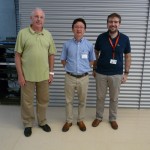Abstract
In natural systems, channel proteins are responsible for the processing of ion and molecular inputs and exports, sensing environmental stimuli and signals across cell membranes. Because of the important function of channel proteins, chemists proposed to construct artificial systems to mimick the function of the channel proteins, which might help us on understanding the transport mechanisms, creating materials for separation, and developing therapeutic agents. We are interested in the construction of confined unimolecular tubular channels by considering their predictable conformation, high capacity of inserting into lipid bilayers. By using the rigid and symmetric pillar structure of pillararene, we have constructed a series of synthetic tubular molecules which have displayed unique properties for selective transmembrane transport of proton, water, amino acids, and voltage-gated and uphill transport of K+. By further precise modification of the channel structure, we have also achieved the selective recognition of the bilayer membrane of Gram-positive bacteria, which led to the high antimicrobial activity.
